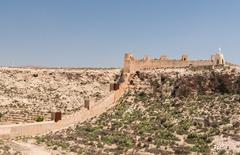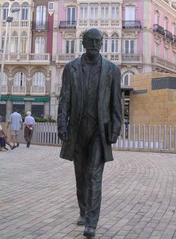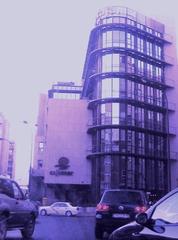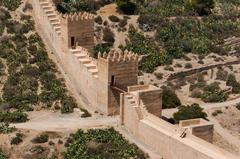Rambla de Belén, Almería, Spain: Visiting Hours, Tickets, and Historical Sites Guide
Date: 14/06/2025
Introduction
Nestled in the vibrant city of Almería, Spain, the Rambla de Belén is a remarkable urban promenade that seamlessly intertwines the city’s rich history with its dynamic present. Evolving from a natural riverbed into a thriving civic artery, the Rambla today serves as a picturesque green corridor, cultural hub, and social landmark. This comprehensive guide explores its historical evolution, cultural significance, visitor amenities, and practical information—making it an essential reference for travelers, history enthusiasts, and locals alike (La Voz de Almería; Planeta Almería; Turismo de Almería).
Contents
- Origins and Early Development
- Urbanization and the Threat of Floods
- Social and Cultural Significance
- Urban Transformation in the 20th Century
- Environmental and Infrastructural Role
- Community and Social Services Hub
- Urban Connectivity and Civic Identity
- Cultural Celebrations and Festivities
- Social Integration and Multiculturalism
- Everyday Life and Local Economy
- Rambla de Belén: Visitor Information
- Key Attractions and Photographic Spots
- Accessibility, Tickets, and Guided Tours
- Events and Social Life
- Gastronomy and Leisure
- Green Spaces and Recreation
- Safety and Visitor Amenities
- Environmental Initiatives
- Practical Tips for Visitors
- Frequently Asked Questions (FAQ)
- Nearby Historical Sites and Attractions
- Current and Upcoming Developments
- Visuals and Media Recommendations
- Conclusion
Origins and Early Development
The Rambla de Belén began as a natural seasonal watercourse, shaped by rainwater flowing from the Sierra de Gádor. Historically, these ramblas were vital for channeling water and facilitating trade, with merchants and travelers using them to transport goods to the port of Almería before the railway’s arrival (La Voz de Almería).
Urbanization and the Threat of Floods
As Almería expanded during the 19th century, the Rambla, like others in the region, posed both opportunities and risks. While it enabled movement and commerce, flash floods were a constant threat—most notably the catastrophic flood of 1891. This event led to major engineering projects to channel the rambla, culminating in the construction of the Monumento a la Caridad in memory of the victims (Planeta Almería).
Social and Cultural Significance
More than a waterway, the Rambla de Belén became a defining feature of Almería’s collective identity. The surrounding area hosted family gatherings, community events, and religious festivals such as San Blas, while also providing refuge during the Spanish Civil War (La Voz de Almería).
Urban Transformation in the 20th Century
Mid-20th-century urbanization transformed the rambla from a utilitarian space into a structured public avenue. By the 1950s, embankments, road improvements, and new public spaces had reshaped the area, integrating it into Almería’s growing urban fabric (Bajo el Manzanillo).
Environmental and Infrastructural Role
Despite urbanization, the Rambla retains its function as a drainage channel, especially during heavy rains. Infrastructure such as the Salto del Gallo and local dams play a crucial role in water management. Recent initiatives focus on environmental restoration and reforestation to enhance biodiversity and water absorption (Diario de Almería).
Community and Social Services Hub
The Centro de Servicios Sociales Rambla Belén-Amatisteros is a cornerstone of local social support, offering emergency assistance, integration programs, and services for families, immigrants, the elderly, and other vulnerable groups. Located at C/ Ópalo s/n, the center is accessible and inclusive, reflecting the rambla’s role as a social backbone for the community (Diario de Almería; Guía de Recursos Almería).
Urban Connectivity and Civic Identity
Recent projects enhance the Rambla’s connectivity, linking it with Almería’s port and reinforcing its role as a civic artery. The wide, tree-lined avenues and pedestrian-friendly design encourage daily social interaction, making it a favored location for public events, demonstrations, and community gatherings (Almería Hoy).
Cultural Celebrations and Festivities
Rambla de Belén is a central stage for Almería’s major cultural and religious events. Semana Santa processions, Carnival, and the Feria de Almería all utilize the promenade, transforming it into a lively hub of music, dance, and celebration (Adventure Backpack; Turismo de Almería).
Social Integration and Multiculturalism
The area’s diversity is celebrated through targeted integration programs and multicultural events, fostering intercultural dialogue and community cohesion (Guía de Recursos Almería).
Everyday Life and Local Economy
Lined with shops, cafés, and small businesses, the Rambla supports local entrepreneurship and provides a setting for family-friendly leisure, markets, and spontaneous social encounters.
Rambla de Belén: Visitor Information
Visiting Hours and Tickets
- Open 24/7: The Rambla is a public avenue with free access at all times.
- Social Services Center: Open Monday–Friday, 9:00 AM–2:00 PM.
Accessibility
- Pathways: Wide, gently sloping, and wheelchair/stroller accessible.
- Transport: Served by several city bus lines and nearby parking; bicycle rentals also available.
- Upgrades: Ongoing improvements enhance accessibility and green spaces (euroweeklynews.com).
Practical Tips
- Best Times: Spring and autumn for pleasant weather; late afternoons and evenings for local vibrancy.
- What to Bring: Comfortable shoes, water, sun protection in summer.
- Language: Spanish is primary, but English is widely understood in tourist areas.
- Facilities: Public restrooms, benches, shaded areas, free Wi-Fi near cafés and municipal buildings.
Key Attractions and Photographic Spots
- Plaza de las Velas: Illuminated fountains and sail-like structures, especially stunning at night.
- Monumento a la Caridad: Memorializing the 1891 flood victims.
- Jardines de la Rambla: Lush gardens with playgrounds and fitness areas.
- Art Installations: Public art reflecting Almería’s maritime and agricultural heritage.
- Auditorio Maestro Padilla & Civic Buildings: Venues for concerts, exhibitions, and cultural events.
Ideal photo spots include tree-lined avenues, public art, fountains, and panoramic views from nearby La Molineta quarries.
Events and Social Life
The Rambla hosts concerts, artisan markets, open-air exhibitions, and major festivals throughout the year. Notable events include Semana Santa processions, Carnival, and the Feria de Almería. The lively ambiance is complemented by food stalls, street performers, and pop-up markets.
Gastronomy and Leisure
- Dining: A range of cafés, tapas bars, and restaurants—try local dishes like “tapas de pescado” and “gurullos.” Outdoor terraces are perfect for people-watching.
- Shopping: Boutiques, souvenir shops, and market stalls offer local crafts and products.
Green Spaces and Recreation
Jogging, cycling, and family activities are encouraged by playgrounds, interactive water features, and fitness stations. The Rambla also connects easily to Almería’s Mediterranean beaches.
Safety and Visitor Amenities
The area is considered safe, with regular police patrols and good lighting. Amenities include information kiosks, public restrooms, drinking fountains, and bilingual signage.
Environmental Initiatives
Sustainability is emphasized through LED lighting, water-efficient irrigation, recycling stations, and planting of native flora.
Frequently Asked Questions (FAQ)
Q: Is there a fee to visit Rambla de Belén?
A: No, it is free and open to the public 24/7.
Q: When is the best time to visit?
A: Spring and autumn for weather; evenings and weekends for events and local life.
Q: Is the Rambla accessible for people with disabilities?
A: Yes, with wide pathways and ramps; ongoing improvements further enhance accessibility.
Q: Are guided tours available?
A: Yes, guided and virtual tours are offered by local providers; check in advance for schedules.
Q: What are the nearby attractions?
A: Alcazaba Fortress, Cathedral of Almería, Central Market, Paseo Marítimo, and Paseo de Almería.
Nearby Historical Sites and Attractions
- Alcazaba of Almería: Moorish fortress with panoramic views.
- Cathedral of Almería: Historic fortress-cathedral.
- Cable Inglés: Iconic industrial-era iron pier.
- Central Market: For local produce and culinary delights.
- Paseo Marítimo: Seaside promenade.
All are within walking distance or accessible by public transport from the Rambla.
Current and Upcoming Developments
2025 marks a significant milestone with major upgrades: expanded green spaces, improved accessibility, and enhanced visitor facilities—celebrating the Rambla’s 25th anniversary as a pedestrian boulevard (euroweeklynews.com).
Visuals and Media Recommendations
Include high-quality images of:
- Tree-lined promenade
- Monumento a la Caridad
- Plaza de las Velas fountains
- Family-friendly gardens
- Major events and processions
Alt text examples:
- “Rambla de Belén tree-lined avenue with pedestrians in Almería”
- “Monumento a la Caridad commemorating 1891 flood victims”
- “Semana Santa procession on Rambla de Belén”
Conclusion
Rambla de Belén is much more than a boulevard—it is Almería’s living, evolving heart. From its geological origins and dramatic history to its vibrant present as a social, cultural, and recreational hub, the Rambla welcomes all visitors. Whether you’re soaking in a festival, enjoying local cuisine, or simply strolling its shaded avenues, you’ll experience the very essence of Almería.
For real-time updates, guided tours, and personalized itineraries, download the Audiala app and follow our social media channels.
References
- La Voz de Almería
- Planeta Almería
- Diario de Almería
- Bajo el Manzanillo
- Turismo de Almería
- The Crazy Tourist
- Euro Weekly News
- Guía de Recursos Almería
- Almería Hoy
- Adventure Backpack



